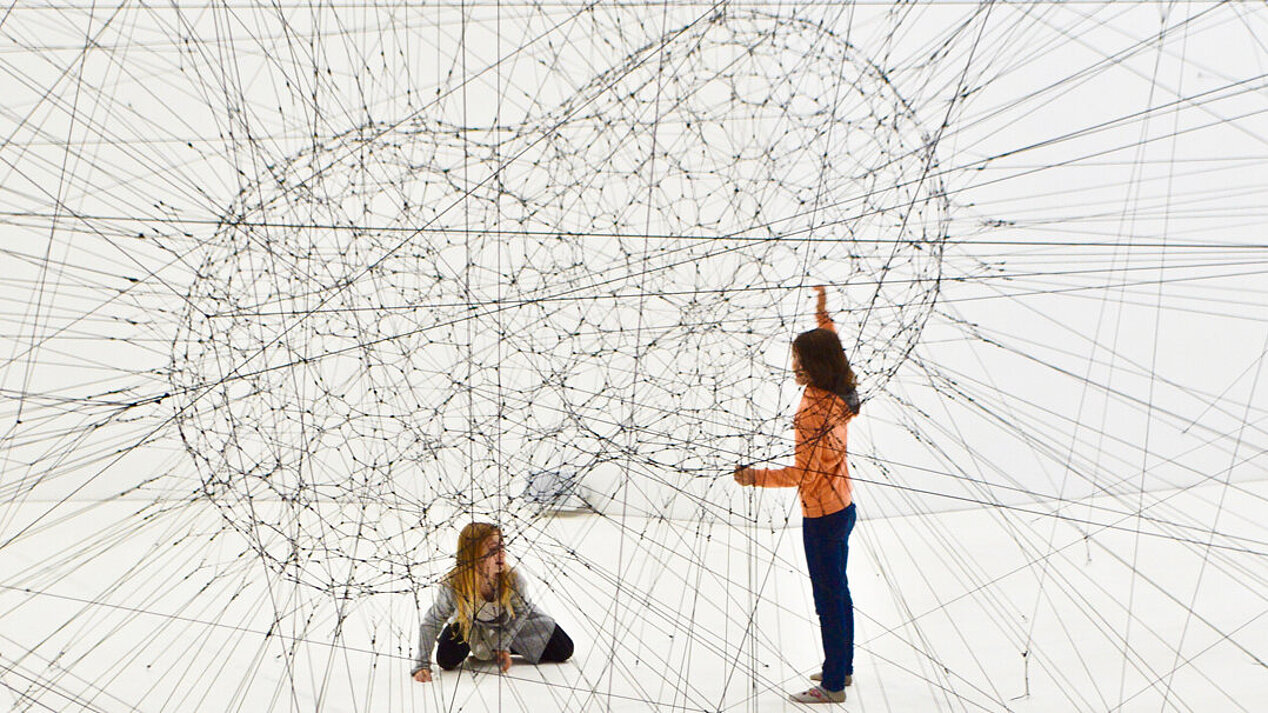
The pandemic that has been going on for over a year now is exacerbating existing political, social and economic crises. While the urgency of the climate emergency might be recognised by four major international negotiations this year, this and other global crises are also causing further polarisation in societies and being exploited by some for cultural manipulation.
These struggles may be understood as cumulativ or related. Reactions might deepen sectorial governance, or, on the other hand, they might open opportunities to re-imagine and reconceive the spatiality, economy and social formation of international relations. Long-term transformations in geopolitical power distribution, in struggles for social equality and thus even in the very project of modernity might be in sight.
What are 'good' cultural relations practices under these circumstances? How do different cultural actors and academic disciplines conceptualise such processes of (re-)ordering? Are new spaces, new alliances, new network formations, new concepts of belonging evolving?
Researchers, practitioners, policy makers and others interested in the above topics and questions are warmly invited to join ICRRA members to discuss international cultural relations under the overarching theme 'Cooperation in a Fragmented World'.
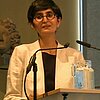
Nikita Dhawan is Professor of Political Theory and History of Ideas at TU Dresden. Her publications include: Impossible Speech: On the Politics of Silence and Violence (2007); Decolonizing Enlightenment: Transnational Justice, Human Rights and Democracy in a Postcolonial World (ed., 2014); Global Justice and Desire: Queering Economy (co-ed., 2015); Negotiating Normativity: Postcolonial Appropriations, Contestations and Transformations (co-ed., 2016); Difference that makes no Difference: The Non-Performativity of Intersectionality and Diversity (ed., 2017) and Reimagining the State: Theoretical Challenges and Transformative Possibilities (co-ed., 2019). She received the Käthe Leichter Award in 2017 for outstanding achievements in the pursuit of women's and gender studies and in support of the women's movement and the achievement of gender equality.
Read less
Read more
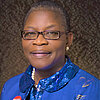
Oby Ezekwesili is the Founder and Chairperson of SPPG (School of Politics, Policy and Governance established by the #FixPoliticsInitiative which she also co-chairs. She is the President of Human Capital África and currently runs the Africa Economic Development Policy Initiative (AEDPI). Dr. Ezekwesili is a former Vice President of the World Bank, Africa Region. She was a Minister of Education and also of Mineral Resources of Nigeria. She is Co-Convener of #BringBackOurGirls Campaign, a group of diverse citizens advocating for the speedy and effective search and rescue of school girls abducted from the secondary school in Chibok on the 14, April 2014, Nigeria. She was one of the co-founders of Transparency International and was one of the pioneer directors of its Global Board in Berlin from 1994 – 1999. Ezekwesili was a Presidential Candidate in the 2019 election in Nigeria.
Read less
Read more

Walter D. Mignolo is William H. Wannamaker Professor and Director of the Center for Global Studies and the Humanities at Duke University. He was associated researcher at Universidad Andina Simón Bolívar, Quito, 2002-2018) and an Honorary Research Associate for CISA (Center for Indian Studies in South Africa), Wits University at Johannesburg (2015-2019). He is a Senior Advisor of DOC (Dialogue of Civilizations) Research Institute, based in Berlin. He received a Doctor Honoris Causa Degree (2016) from the University National of Buenos Aires, Argentina, and Honorary Degree (2018) from the University of London-Goldsmith. Among his books related to the topic are: The Darker Side of the Renaissance. Literacy, Territoriality and Colonization (1995); Delinking: The Rhetoric of Modernity, the Logic of Coloniality and the Grammar of Decoloniality (2007); Local Histories/Global Designs: Coloniality, Subaltern Knowledges and Border Thinking (2000); The Idea of Latin America (2006); On Decoloniality: Concepts, Analysis, Praxis, co-authored with Catherine Walsh (2018) and The Politics of Decolonial Investigations (scheduled for June of 2021).
Read less
Read more

is co-founder of re:publica, a conference on digital society and social media. He is a network political activist and journalist and was editor-in-chief until 2013 of Netzpolitik.org, a blog he founded in 2002 on information society. From 2010 to 2013 he was an expert in the Enquete Commission of the German Bundestag on internet and digital society. He is the author and editor of various books on issues relating to the digital world and has received numerous prizes and awards, including the Grimme Online Award in the Special Category and the Günther-Wallraff‐Journalism Critique Award.
Read less
Read more
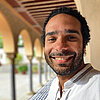
Pedro Affonso Ivo Franco is a Brazilian percussionist and consultant working across cultural, creative and international cooperation sectors. Holding an MA in International Relations and Cultural Diplomacy from Furtwangen University, Germany, Pedro’s areas of expertise include culture and sustainable development, decolonial perspectives in international cooperation and the intersection between arts, culture, and climate.
Read less
Read more

is the General Director of The Festival Academy, a non-profit organisation initiated by the European Festivals Association (EFA). She is also a member of the advisory committee for the Agency of Arts and Heritage in Flanders.
Read less
Read more

Naren Chitty is Emeritus Professor of International Communication at Macquarie University Sydney. He earned his PhD, MA with a focus on International Relations and International Communication in 1992 from the School of International Service at American University. He is also founding director of the Soft Power Analysis & Resource Center (SPARC) and editor-in-chief of "The Journal of International Communication". In 2009 he was awarded the Order of Australia. His publications include the Routledge Handbook of Soft Power (2017) and the series "Anthem Studies in Soft Power and Public Diplomacy".
Read less
Read more

is Visiting Research Fellow in the Department of Culture, Media and Creative Industries of King's College London and Visiting Lecturer at the Institut Catholique de Paris, among other roles. As a Research Fellow at the Centre on Public Diplomacy of the University of Southern California, Mafalda undertook primary research focused on EUNIC's 2019–2021 European Spaces of Culture pilot projects.
Read less
Read more

is an expert and researcher in culture and creative economy. She holds a PhD in Sociology from University of Porto. Cristina was member of Selection and Monitoring panel of European Capitals of Culture in 2015– 2020.
Read less
Read more
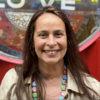
Carla Figueira is an academic and consultant in the field of international cultural relations and creative industries. She did her PhD on external language spread policies in Mozambique and Guinea-Bissau at City University London, with a Praxis XXI Scholarship.
Read less
Read more

is an academic and consultant in arts and cultural management, cultural policy and international cultural relations. She is an Assistant Professor and former Director of the Arts Management Program at George Mason University, also serving as Director, National Resource Center for Creative Forces®: National Endowment for the Arts' Military Healing Arts Network.
Read less
Read more

is a lecturer in Islamic Communication and Broadcasting at the Faculty of Islamic Studies, Universitas Muhammadiyah Yogyakarta, Indonesia. She has a PhD in International Communication from Macquarie University, Australia. Her research interests include intercultural communication, Islamic media and the impact of new media on religious behaviour among teenagers.
Read less
Read more

is Vice Dean, Faculty of Arts and Science, at Queen's University, Canada, and Director of the North American Cultural Diplomacy Initiative (NACDI). A former Canada–U.S. Fulbright Scholar, her research focusses on the use of art exhibitions in cultural diplomacy.
Read less
Read more
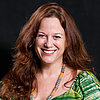
Development economist Avril Joffe heads the Cultural Policy and Management Department at the Wits School of Arts, University of the Witwatersrand. Her areas of focus are cultural policy design, implementation and evaluation and mapping and assessment of the cultural economy. Avril has developed cultural policy frameworks and training programmes for arts management and cultural entrepreneurship. As a policy analyst and consultant, she has worked for international and national organisations and governments across Africa.
List of publications:
Read less
Read more

is Head of Policy Insight at the British Council. She is a University of Oslo graduate in social anthropology, human geography and psychology, and has a MSc in Social Psychology from the London School of Economics and Political Science.
Read less
Read more

Stuart MacDonald is a specialist in international cultural relations. He founded the Centre for Cultural Relations at the University of Edinburgh to develop both the theory and practice of cultural relations through an innovative, interdisciplinary approach to research, study and knowledge-sharing. MacDonald has conducted numerous consultancy projects for the EU, the UK and Scottish governments and has developed cultural exchange programmes in China, the US, France, Germany, Sweden and Italy. As a senior civil servant of the British and Scottish Governments, MacDonald has worked in cultural, constitutional and education policy and headed the Arts Department of the Scottish Arts Council. He is a Fellow of the Royal Society of Arts in London and currently advises universities in Germany and the UK on their EU strategies.
Read less
Read more

is a consultant and researcher in cultural and social impact programmes and communication. Dr Magkou is Associate Researcher at University of Côte d'Azur's SIC.Lab. She is an alumnus of the Cultural Diplomacy Platform's Global Cultural Leadership Programme.
Read less
Read more

Mohlahlana is an award-winning TV and radio broadcast journalist. She's a senior news anchor for South Africa's newly launched 24hr channel Newzroom Afrika. In 2014, Cathy was selected as a fellow for US President Barack Obama's Young African Leaders Initiative (YALI). She holds a Politics and International Relations degree from Wits university.
Read less
Read more

is a Postdoctoral Fellow at the Institute for the Advanced Study in the Humanities (IASH) at the University of Edinburgh and the Social Science Research Council (SSRC) African Peacebuilding Network (APN).
Read less
Read more
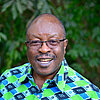
Kimani Njogu is Excutive Director of Twaweza Communications Limited in Nairobi. Twaweza Communications works in the areas of public policy, media and culture for sustainable development. Kimani Njogu holds a PhD in Linguistics from Yale University and has taught at Kenyatta University in Nairobi. He has published widely on art, culture and politics.
A selection of books:
Read less
Read more

Ojoma Ochai is the Executive Director for Creative Industries at the Co-Creation Hub in Lagos. This hub promotes trade and stimulates the growth of Africa's creative industries through research, investment and innovation. Previously, Ochai was the British Council's Regional Director for Arts and Creative Industries for Sub-Saharan Africa. She is a member of the UNESCO Panel on the Convention on Cultural Expressions.
Read less
Read more

is Head of Research in the Research & Policy Insight team at the British Council. He has a PhD in History from the University of London and his work for the British Council is centred around supporting good research practice, enhancing organisational research capacity and promoting knowledge exchange and collaboration.
Read less
Read more

Venka Purushothaman is deputy president and provost at LASALLE College of the Arts, Singapore. He is an award-winning art writer, and holds a PhD in Cultural Policy and Asian Cultural Studies from The University of Melbourne.
Venka founded the Asia-Pacific Network for Culture, Education and Research (ANCER) and co-founded the Global Design Initiative. He chairs the Strategy Board of Zurich-based Shared Campus, a consortium of arts universities developing new art and design educational paradigms. And he chairs the International Advisory Board of the New York-based Living Arts International and is a member of ICRRA.
Venka’s research focuses on contemporary art, cultural policy and relations, and cultural and educational leadership. He is the author of several publications, including The Art of Sukumar Bose: Reflections on South and Southeast Asia (2013).
Read less
Read more

is the Founder and President of Inclusartiz Institute in Brazil, non-profit organisations which promotes cultural initiatives to bring art, culture and education closer to all sections of society. She is Member of the Senior Advisory Board of the Brazil Institute-School of Global Affairs, Kings College, London, and member of the Instituto de Consejeros-Administradores, Madrid.
Read less
Read more

is an independent consultant in international cultural cooperation, network and process governance, based in Berlin. She is very familiar with international cultural cooperation policies. She holds a Master's in Public Policy and in Cultural Sciences.
Read less
Read more

is a creative facilitator, trans-disciplinary narrative designer, educator, writer and futurist. She focuses on social, environmental and cultural issues, inter-weaving design thinking, imagination, complex systems thinking, pedagogy, crafts, entrepreneurship, visual and performing arts, oral history, ethnography, and research to co-create inclusive and regenerative possibilities.
Read less
Read more

Ian Thomas is Head of Evidence, Arts at the british Council. He has over 20 years of experience working with arts and cultural organisations. He is a former Visiting International Research Fellow at the Centre for Public Diplomacy at the University Southern California, and a Fellow of the Royal Society of Arts. Ian has published several articles on arts and cultural relations such as “Building an Impact Evaluation Toolbox based on an Arts and Soft Power Ecosystem” published by Figueroa Press: Los Angeles.
Read less
Read more

Dr Odila Triebel heads the Dialogue and Research Department "Culture and Foreign Policy" at ifa. Her focus is the reflection of global cultural relations at conferences and in academic publications. She previously taught at Rice University, Houston, and at the University of Tartu. Triebel studied literature, philosophy and public law in Heidelberg, Sussex and Berlin. As a fellow at the DFG graduate school 'Representation-Rhetorics-Knowledge' in Frankfurt (Oder), her focus was on political representation and concepts of the nation-state.
Read less
Read more

is a theatre director and the founder and former executive director of India Foundation for the Arts and the co-founder of Toto Funds the Arts. His writing and talks – on arts entrepreneurship, the creative economy, the role of grant-making foundations, culture and development, intercultural dialogue and the performing arts, for example – have reflected on the insights he has gleaned from his long engagement with the arts and philanthropy.
Read less
Read more

is an expert in cultural relations, policy development, international project management, cross cultural creative facilitation and research. She is the co-author of Europe China Cultural Compass for EUNIC and advisor to the EU.
Read less
Read more

César Villanueva is a professor of International Relations and Public / Cultural Diplomacy at Universidad Iberoamericana, Mexico City. He has a PhD in Political Science from Linnaeus University in Sweden, and is a frequent lecturer on Cultural Relations, Soft power, international images and cultural / public diplomacy.
Read less
Read more

Christine Wilson is Director of Research and Insight at the British Council and is responsible for research standards, ethics and practice, networks and development. Her Next Generation research series seeks to engage young voices globally in policy making. For the British Council, she has been actively involved in the Hammamet Conference and the Peace and Beyond Conference. Wilson is an advisory board member of the Institute for Advanced Studies in the Humanities at the University of Edinburgh and a Fellow of the Royal Society of Arts.
Read less
Read more
"There is no modernity without #coloniality - #WalterMignolo at our ICRRA Conference
? Register for the upcoming sessions: https://t.co/r2mKFreCQt pic.twitter.com/lf3Yz56SxT ifa (Institut für Auslandsbeziehungen) (@das_ifa) October 13, 2021
"The future of multilateralism, of capitalism, of work (...) or of the SDGs is now! - we don't have time to waste!" - @obyezeks at our ICRRA Conference
— ifa (Institut für Auslandsbeziehungen) (@das_ifa) October 14, 2021
"The state is like a pharmakon – it can be both poison and medicine." - #NikitaDhawan at our ICRRA Conference in her talk on Global Ethics and the Imperative to #SaveThePlanet.
— ifa (Institut für Auslandsbeziehungen) (@das_ifa) October 15, 2021
? https://t.co/r2mKFreCQt pic.twitter.com/5EjQkanjYq
Researchers and practitioners exchange views on questions of international cultural relations through the International Cultural Relations Research Alliance (ICRRA) network. The network sees itself as a bridge builder between practical cultural work, academic reflection, policy advice and the media. It supports the transfer of research-based knowledge into politics and society and promotes evidence-based discourse. Find out more on the ifa website.
Project Coordinator Dialogue and Research Culture and Foreign Policy
Charlottenplatz 17
D-70173 Stuttgart